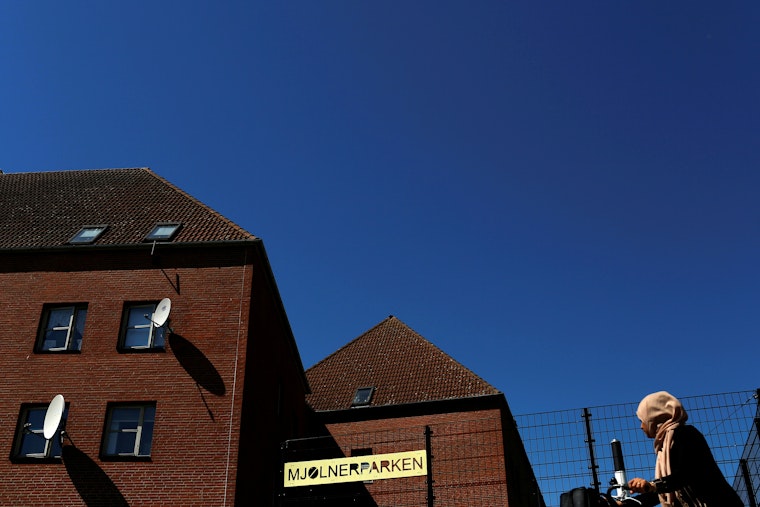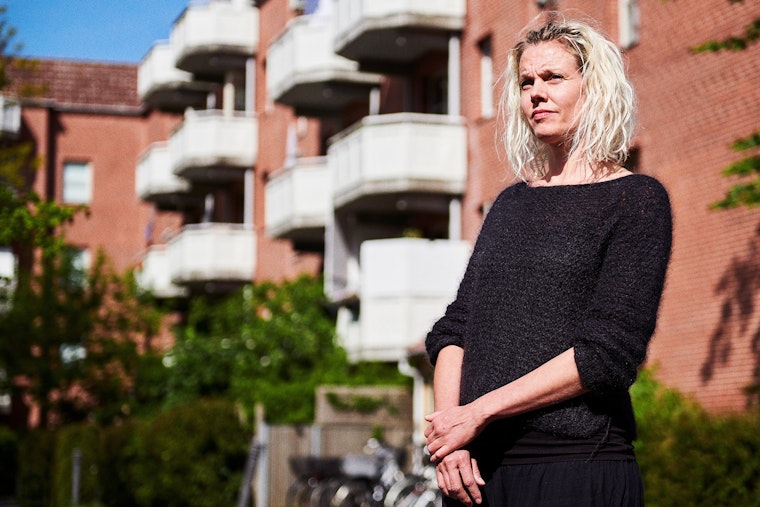Q&A: My Fight to Save My Home Under Denmark’s Harsh “Ghetto Plan”

In March 2018, the Danish government announced the so-called Ghetto Package, a set of harsh laws and policies in low-income, largely minority neighborhoods. The neighborhoods targeted under the plan must be 50 percent or more residents of “non-Western” background, as defined by the State.
One piece of the legislation seeks to reduce common family housing in so-called tough ghettos to 40 percent by 2030. Now, thousands of people from diverse backgrounds across Denmark are facing evictions.
Residents of Mjølnerparken in Copenhagen have filed a lawsuit arguing that the eviction plan is unlawful because it is discriminatory under EU law and the European Convention on Human Rights and violates their fundamental rights, including the right to respect for their homes.
Open Society Justice Initiative spoke to Majken Felle, one of the plaintiffs who lives in Mjølnerparken.
Tell us about Mjølnerparken.
Mjølnerparken is located in a Copenhagen neighborhood, called Nørrebro. Many residents have lived and raised their families here since it was built in 1987. Now, their grown-up sons and daughters come to visit with their grandchildren. Some have even settled in Mjølnerparken. It is really cool for the kids that they have their grandparents just two doors away. When somebody is ill, the relatives are always close.
I moved here nearly six years ago. Before that, I lived in many other neighborhoods in Copenhagen, including “hipster” Vesterbro and the “upscale” inner city. Mjølnerparken is, by far, the nicest place I have lived in Copenhagen.
What do you want others to know about the community in Mjølnerparken?
What makes it different is the feeling you get when you live here. The atmosphere is so warm and welcoming. From my apartment, I hear the happy voices of kids playing, mixed with the voices of their mums, grandmothers, or aunts sitting and chatting while having coffee. It’s like the sound of the sea. Sometimes I join my neighbors on the playground, and we talk about all kinds of things.
I don’t know if it is because so many of us come from so diverse backgrounds, have different mother tongues, and sometimes very different life experiences, but I really feel that people here are really open-minded and tolerant towards all outlooks on life and ways of living life. When I talk to my neighbors, I feel acceptance and willingness to connect.
And of course, we help each other a lot too. I am a teacher, so sometimes I help some of the teenagers in high school with their homework. Likewise, people always offer me help, for example, if they see me carrying heavy stuff.
After having lived here a couple of years, I have gotten to know many of my neighbors, and we have a really nice community here. I feel a strong support system and I feel really safe.
How has the “Ghetto Package” and the planned evictions changed your life in Mjølnerparken?
The ”Ghetto Package“ has changed everything! I don’t know where I’ll be living in a year from now, two years from now, or five years from now. I don’t even know when I would have to move. It is really stressful.
When I got the notice last year that the housing association was planning to sell my building, I was paralyzed. But after two months, I decided to join the fight for our right to our homes. Since then, I have divided my days between my work as a primary school teacher and community organizing in Mjølnerparken.
One recurring activity is the Neighbor Café every Monday evening. We started the café around six months ago in response to the evictions. Our community is strong and even though this is a tough time, we find room to have fun and connect. I am sure the Neighbor Café will continue for as long as we are here.

What, in your view, is wrong with the “Ghetto Package?”
I think that the “Ghetto Package” is wrong in every aspect! To begin with, the whole premise that so-called “parallel societies” of immigrants in Denmark exist and that they live isolated in the so-called ghettos is completely wrong. I live here, as a Danish-born woman, and I connect with my neighbors from all walks of life. I live alongside Danish people in various generations, immigrants who come from many places, the teenagers born in Denmark, and my neighbors from the senior collective.
We people in Mjølnerparken go to work and school all over Copenhagen. We do not live in an isolated parallel society. That is simply not true.
Furthermore, many of the young people attend university and thereby make a huge leap in educational level compared to some of the first generation of immigrant parents, who come from backgrounds of war and refugee camps. The story that should be told about Mjølnerparken is a story of social mobility. A story of successful integration. That is the reality I live in.
Why is this litigation important to you?
Every citizen of Denmark must become aware that this is going on in our country, and this lawsuit is one step. Most people are shocked when I tell them. I want to raise consciousness about what is happening and restore justice.
And of course, most of all: I want to keep my home and my community. This is not just an apartment, somewhere to live. It is my home.
What would it mean to your community, and to Denmark, if you win this case?
I would be able to stay in my home! I would be safe. I would get to keep my neighbors and the community. The community would survive. People would be able to continue to live close to their relatives and social support systems. Kids would be able to stay in their school and keep their friendships.
And for Denmark? It would mean we would stay a country that is democratic and respects basic human rights.
